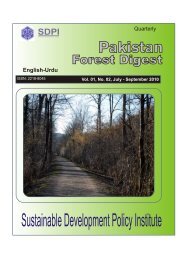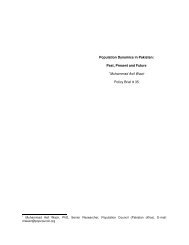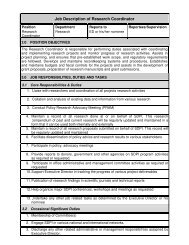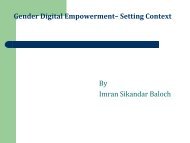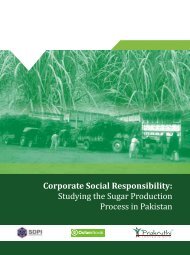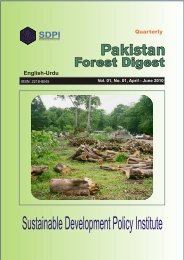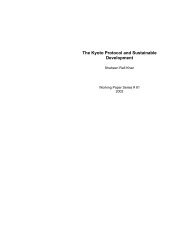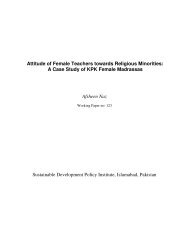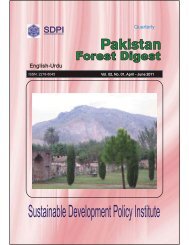Annual Report 2009-10 - Sustainable Development Policy Institute
Annual Report 2009-10 - Sustainable Development Policy Institute
Annual Report 2009-10 - Sustainable Development Policy Institute
- No tags were found...
You also want an ePaper? Increase the reach of your titles
YUMPU automatically turns print PDFs into web optimized ePapers that Google loves.
<strong>Annual</strong> <strong>Report</strong><strong>2009</strong> - 20<strong>10</strong>intensity and frequency of the floods is increasing with time increasingly affecting livelihood ofthe local residents. In the mountainous region of Gilgit, increased frost in the fields and meltingglaciers are becoming impediments in the yield of crops making marginalised and small farmersvulnerable to food security.Decreased livestock, production of crops and decreased numbers of fish resulting from catastrophessuch as the floods have resulted in poverty and have attributed to the loss of livestock andcrops during these calamities. On the contrary there has been no planning at the policy level tohelp these people adapt to the changing climate thus making survival difficult for them. Farmerssuggest that training based on adoption of climate friendly technologies & use of climate changeresistant seeds can help alleviate the problem of poverty.The study “Impact of Climate Change and food security on poverty” in Pakistan is being conductedby SDPI in collaboration with the Consumer Unity and Trust Society (CUTS International).SDPI with its nation wide established network and skills in the field of research is facilitatingin data collection and data management of the information gathered from three of theeleven agro ecological zones in Pakistan. The three agro ecological zones include Badin, Bahawalpurand Gilgit selected on the basis of the difference in geographical features, climate andagricultural practices thus presenting a difference in the resultant impact of climate change onindigenous agriculture, food security and livelihood. The study will enhance an understanding ofthe impact that climate change has / could have on agriculture, so that required measures canbe taken to raise awareness and suggest measures for coping with climate change inducedproblems.The first round of the study entailed a survey of small and marginal farmers, and fishermen,whose livelihoods are highly dependent on natural resources and local climatic conditions. Itaimed at understanding their perceptions about climate change and its occurrence, and the impacton their incomes and food security. The second round encompassed a survey of professionalsstudying issues of climate change, either through scientific tools of measurement andobservation or through their work on communities affected by climate change. The overall objectiveis to aggregate the perceptions of these stakeholders, both national and international, andestablish the impact of climate change on agriculture, fisheries, and livestock.For further details contact Ms. Mome Salim. mome@sdpi.orgClimate Change Adaptation: Improving Environment through Reduction in Wood Cuttingand Remission in Green House Gases through Fuel Efficient TechnologiesSDPI is one of the partner organizations of the Asia Pacific Forum for Environment and <strong>Development</strong>(APFED), Japan, and is supporting the above mentioned as one of the ten "ShowCase" projects, from over <strong>10</strong>00 projects submitted from Asia Pacifc region for <strong>2009</strong> -<strong>10</strong>. Theproject is being implemented by NIDA-Pakistan; a national non-government organization basedin Kohistan. The main objectives of the project are to raise awareness through social mobilizationand training in the communities and schools on protection of environmental health and climatechange, introducing fuel and energy efficient technologies i.e. smokeless stove in 20 villagesto improve the livelihood and environmental conditions of the communities and to distributeindustrial made stoves in the poorest and most vulnerable communities.With the support of local elders, NIDA Pak. has already constituted village based local communitycommittees in selected villages in Dasu, Palas and Pattan tehsils of District Kohistan, for theimplementation of project activities. Advocacy and awareness raising workshops are being heldto introduce energy efficient technologies (smokeless stoves & solar dryers) to minimize woodcutting to save forests. Appropriate messages to save forests, protection of the environment anduse of fuel efficiency stoves are also inscribed on road side rocks along the Pak-China friendshiphighway. Training of local blacksmiths is also in progress to manufacture low cost fuel efficientstoves workshops.For further details contact Dr. Mahmood Khwaja. khwaja@sdpi.org16S u s t a I n a b l e D e v e l o p m e n t P o l I c y I n s t I t u t e



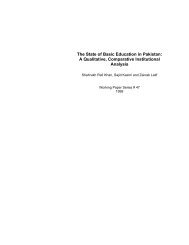
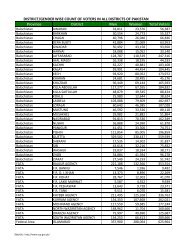
![(October - December, 2010) [13th SDC Special Bulletin]](https://img.yumpu.com/50118608/1/184x260/october-december-2010-13th-sdc-special-bulletin.jpg?quality=85)
